
Articles by Africa
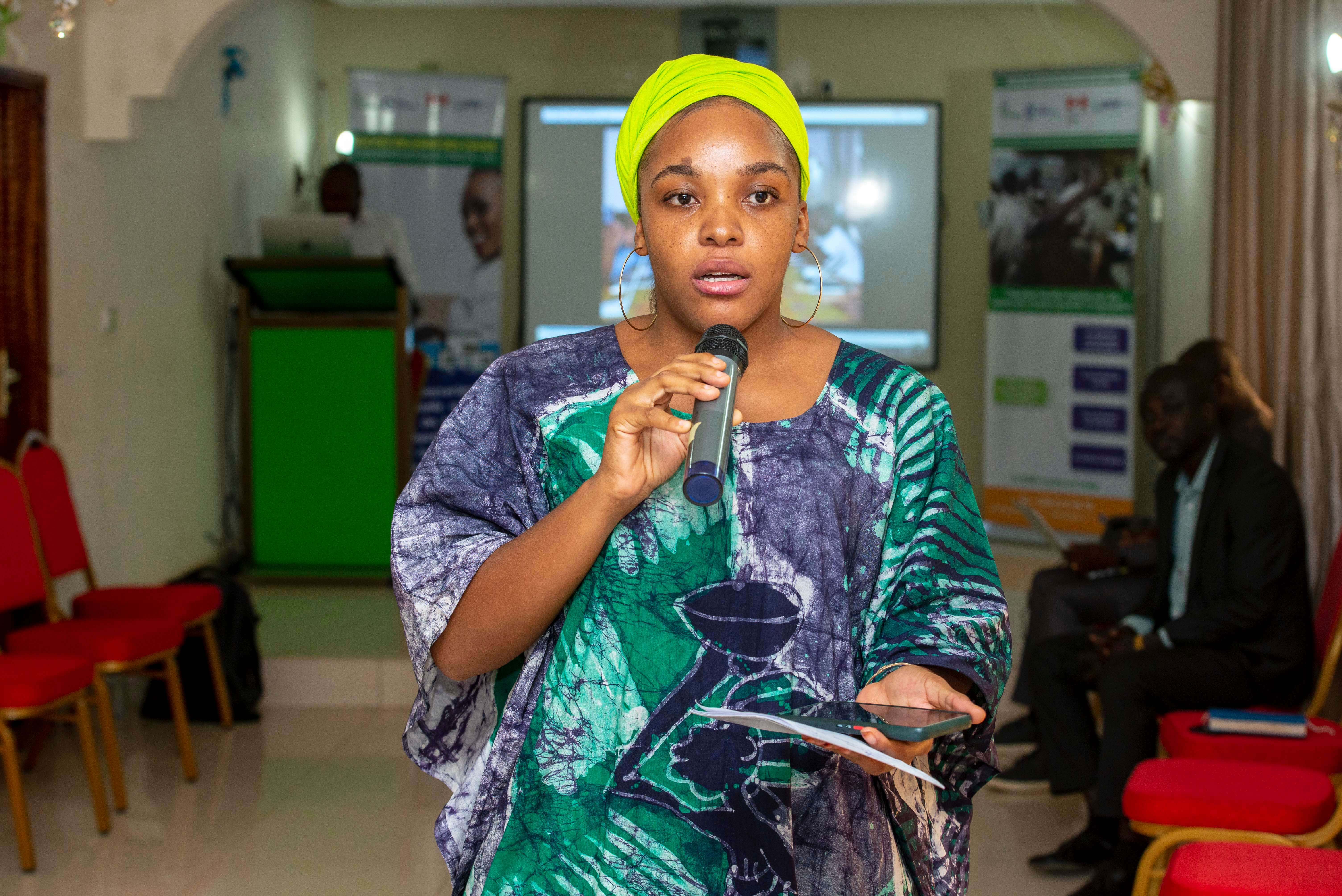
Volunteer becomes “lifelong activist in the name of sexual education” for Togo’s youth
Growing up in Sokodé, a city in central Togo, Hayathe Ayeva dreamed of a career as a health-care professional. She studied hard in school and saw similar drive and lots of potential in the girls around her. But by the age of 12, some of her friends were becoming sexually active. With no access to sexuality education teaching them about consent and bodily autonomy or birth control in the conservative community, the doors to whatever future they had hoped for quickly closed. “I really couldn’t stand to see my friends, who were brilliant at school and surely promised a bright future, suddenly drop out because of early marriage, pregnancy or gender-based violence,” Ayeva recalls. “This is something that saddened and revolted me because I believed that, together, we should go on to higher education and become financially independent. I decided to fully commit myself to the defence of human rights, especially reproductive-health rights.”

IPPF Africa Region urges Ugandan government not to enact harmful anti – LGBTIQ+ law
Nairobi, Kenya: On 21st March 2023 the Ugandan parliament approved a law which, if enacted, would criminalise people for identifying as a member of the LGBTIQ+ community. The proposed law has been through two readings in parliament and is awaiting a third before it is put forward to the President for Assent. If passed, it will be a gross violation of and undermine the human rights and safety of people identifying as LGBTIQ+ in Uganda. IPPF Africa Region is strongly concerned about the numerous ways in which the passing of this law will violate international human rights including the right to life and dignity, freedom of expression and association, protection from discrimination, and will compromise the full and complete attainment of sexual and reproductive health and rights. Additionally, IPPF is extremely concerned about the dangerous message the law sends. In addition to criminalising consent, it encourages hatred, may escalate violence and gender-based violence targeting persons from LGBTIQ+ communities, popular justice, hinders the right to a fair trial, makes it easier to target minority groups, and harder for them to access justice and redress for hate crimes. At a time when countries around the world and in Africa are decriminalising same sex relationships, this law, if passed, will be a serious step backwards for Uganda. Marie-Evelyne Petrus-Barry, IPPF’s Africa Regional Director, said: "IPPF works to ensure the sexual and reproductive health and rights of all people regardless of their sexual orientation, gender identity and/or expression, and sex characteristics (SOGIESC) – including lesbian, gay, bisexual, trans, and intersex people – and ensure they have access to the full set of human rights enshrined in international human rights laws” “IPPF is willing to work with the Ugandan Government and other stakeholders to ensure that all Ugandan people can access their sexual and reproductive rights without fear, discrimination, or restraint", added Petrus-Barry. IPPF strongly urges the President of Uganda to not sign off on this discriminatory law, uphold and safeguard the Universal Declaration and African Charter on Human Rights, and treat all Ugandans equally. IPPF stands with the LGBTIQ+ community in Uganda and globally at this difficult time. For further information or to request an interview, please contact: Mahmoud Garga, Lead Specialist - Strategic Communication, Media Relations and Digital Campaigning, IPPF Africa Regional Office (IPPFARO) – email: [email protected] / Tel: +254 704 626 920 ABOUT IPPF AFRICA REGION (IPPFAR) The International Planned Parenthood Federation Africa Region (IPPFAR) is one of the leading sexual and reproductive health (SRH) service delivery organization in Africa, and a leading sexual and reproductive health and rights (SRHR) advocacy voice in the region. Headquartered in Nairobi, Kenya, the overarching goal of IPPFAR is to increase access to SRHR services to the most vulnerable youth, men and women in sub-Saharan Africa. Supported by thousands of volunteers, IPPFAR tackles the continent’s growing SRHR challenges through a network of Member Associations (MAs) in 40 countries. We do this by developing our MAs into efficient entities with the capacity to deliver and sustain high quality, youth focused and gender sensitive services. We work with Governments, the African Union, Regional Economic Commissions, the Pan-African Parliament, United Nations bodies among others to expand political and financial commitments to sexual and reproductive health and rights in Africa. Learn more about us on our website. Follow us on Facebook, Twitter, Instagram and You Tube.

Feminist Opportunities Now: Empowering Feminist Organizations Around the World
Feminist Opportunities Now (FON) is a programme that aims to build capacity of feminist organisations via subgrants to enhance more diverse and resilience Civil Society Organisations when addressing and responding to gender-based violence, inequalities, discrimination and other human rights violations related to gender. International Planned Parenthood Federation Africa Region (IPPFAR) is the FON consortium lead, with the other consortium partners being Médecins du Monde (MdM-FR), Creating Resources for Empowerment and Action Inc. (CREA), the International Federation on Human Rights (FIDH) and Empow’Her (EH). The programme is funded by the French Government via the French Development Agency (AFD). The action of the consortium's member organizations is based on feminist principles, a deep commitment to the promotion of human rights and the fight against inequalities and discrimination, especially against women and girls. They have a long experience of the themes of the programme mandates and complementary expertise that underpin the robustness of the holistic approach of the programme. The Challenge Gender inequalities on a global scale affect half of the world's population. Gender inequality is one of the main obstacles to human development. The FON Programme seeks to address such inequalities. Some of the challenges leading to these inequalities include: Lack of and/or effective implementation of comprehensive laws, policies, legal instruments to address gender inequalities worldwide, leading to increased gender inequalities. Lack of or limited implementation of the frameworks, which widens inequalities and aggravate the precariousness of women and girls- particularly people with disabilities, living with HIV, sex workers, and those of diverse sexual orientation and gender identity (SOGI) COVID-19 that dramatically exacerbated social and economic challenges leading to an increase in gender-based violence (GBV). Inadequate involvement of people with disabilities (15% of the world's population), LGBTI+, sex workers and people living with HIV-AIDS, in initiatives to promote and defend their rights, and the least associated in preventing and responding to this violence. Inadequate support to nascent or relatively new Civil Society Organizations many of which remain undeclared, and, despite their effervescence and dynamism, they continue to face challenges that restrict their ability to reduce GBV and protect and promote women's rights. Limited creation of an innovative and flexible financing system in order to strengthen the contribution of CSOs in the South, in all their diversity, to the reduction of GBV. Objectives of the Programme To Improve the sustainability of feminist Civil Society Organizations (CSOs) at the organizational and technical levels by proposing an inclusive approach to capacity building. To support the resilience and diversity of feminist CSOs through access to flexible sustainable financing mechanisms tailored to small and/or informal and/or marginalized CSOs. To strengthen a networked movement of feminist CSOs in the Global South, linking these CSOs and national, regional, and international networks, to make their voices heard on the public stage. To promote innovation at all levels of the programme by the CSOs themselves and the consortium member organisations. Targets of the Programme Feminist CSOs working with and/or for the various structurally excluded groups. Activist organizations working with or led by people who may face particularly high discrimination. Gender inequalities and GBV, such as members of the LGBTI+ community and in general people with diverse sexual orientation and gender identities and Gender Expressions (SOGIE). People living with disabilities. People with HIV/AIDS. Sex workers. Indirectly, targets of advocacy activities (regional bodies, national / local authorities, etc) Approaches of the Programme Feminist Opportunities Now (FON) aims to build capacity of feminist organisations via subgrants to enhance more diverse and resilient Civil Society Organisations when addressing and responding to gender-based violence, inequalities, discrimination, and other human rights violations related to gender. FON will set up Regional Coordination and Advisory Committees in each region (Africa, Asia and Latin America), whose role will be to help ensure inclusiveness and identify advocacy opportunities. The Sub-granting will be phased into three categories or funding windows below, and for which the first call for proposals is scheduled to be launched in April 2023: Window 1 / "Boost" The objective is for the feminist CSOs or young feminists to have the enhanced capacity to face external events (political instability, insecurity, etc.) and/or internal hurdles (organisational difficulties, necessary a project co-funding or additional programme component etc.). This window should also allow CSOs to apply for a grant in case of an upcoming opportunity such as in programming, advocacy, etc. Key words are therefore flexibility and opportunity. Window 2/ "Programmatic & Organizational Development" will support small and middle-size CSOs and young feminists that are trying to grow from an organisational, technical and programmatic point of view. The objective is to simultaneously fund a programme while reinforcing the capacities of the recipient organizations programme. Window 3 / "Synergies" will fund networks, movements and alliances to implement advocacy activities on GBV, and organizations that want to get involved in existing networks. It will promote network and alliance building and promote visibility on national, regional and international platforms. Location Justification Equity is a pillar integrated in the FON implementation strategy. The programme will be implemented in 10 countries including six in Africa (Burkina Faso, Ethiopia, Cote d’Ivoire, Guinea, Kenya, and potentially Niger), two in Latin America (Colombia and Mexico) and two in Asia (Bangladesh and Sri Lanka). FON put great consideration to determine the location of the implementation of the programme using below criteria: Countries where the needs of CSOs for support are strong and the potential for exchanges and collaborations is high. Existing normative and policy frameworks but little or no implementation and respect in national law. The needs of the populations are immense and in varying proportions from one country to another, also revealing a wide potential for learning and training. Contexts that exacerbate gender-based violence and increase the need for support for feminist CSOs. Potential for collaboration with other existing and/or new interventions. To read more about the FON consortium partners' workshop, click here.
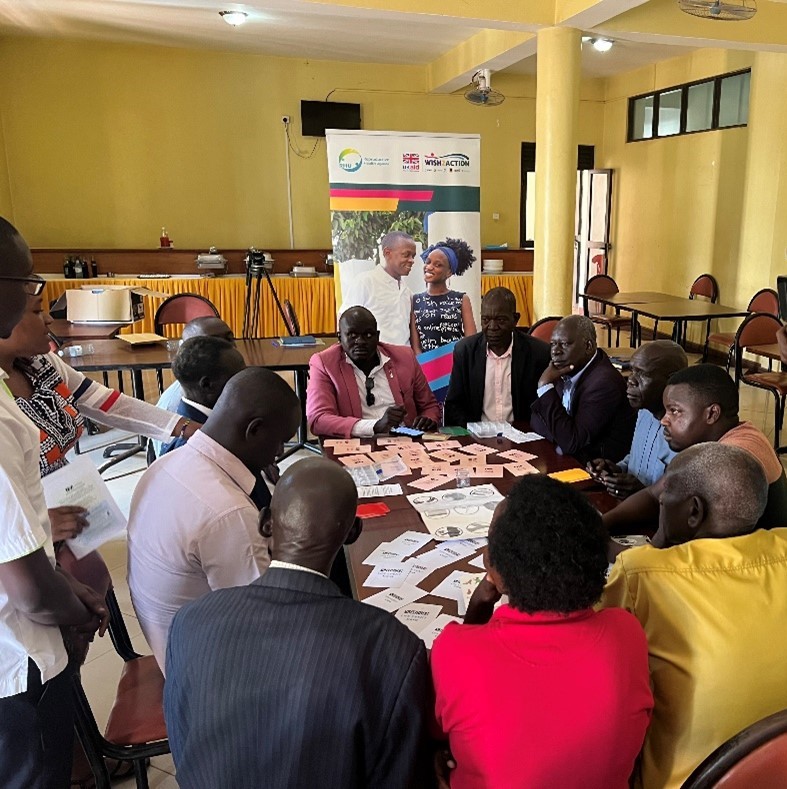
Together we decide: An interactive game that promotes gender equality!
In a bustling meeting room in Lira, Northern Uganda, a group of cultural leaders from the Lango kingdoms are engaged in a lively discussion. The topic at hand is sexual and reproductive health, the advancement of women and girls, and the health of their families. Reproductive Health Uganda (RHU), the International Planned Parenthood Federation member association, has organised and is facilitating the sessions through their team and community health workers. The situation of Women and Girls in Northern Uganda In Northern Uganda, the Lango and Acholi kingdoms are the strongholds of the Lango and Acholi communities. The kingdoms have a rich cultural heritage observing ancient local traditions, practices, and social norms, however some of these norms are restrictive for women’s development and equality such as wife inheritance, child marriage, discouraged education of girls, dangerous traditional termination of pregnancy and harmful practices that halt female development is still the order of the day. Uganda has a high unmet need for family planning, with high teenage pregnancy rates, a Maternal Mortality Rate (MMR) of 336 and the unmet need for family planning stands at 31.1 and yet many view comprehensive sexuality education as the promotion of early sexual debut and the promotion of promiscuity. As is the case in many cultures, harmful social norms and practices form the basis of gender inequality. The WISH2ACTION programme is implemented in Uganda by RHU and is working towards accelerating gender equality in sexual and reproductive health (SRH), by addressing the root cause. To achieve this goal, the programme has recognised the crucial role that men play in shaping the lives of women and girls in Northern Uganda. WISH2ACTION is working to form a pool of men peer cultural mobilisers to act as SRHR champions in these communities. They have engaged cultural leaders in educative dialogue sessions. An Innovative Approach To demystify myths and misconceptions around family planning, WISH2ACTION has collaborated with Intrahealth Uganda to introduce an innovative game called Together We Decide. This interactive tool provides men with sexual and reproductive information and advocates for gender equality by demonstrating how men should have health discussions with their partners and how to keep their families healthy. As the cultural leaders play the game, they are prompted to think about the realities of having children, the economics of child-rearing, and the importance of contraceptive use, birth spacing, subsequent pregnancies, and the health of their children. The game is played with a board, tokens, dice, and cards. The leaders are divided into households and instructed to build families and wealth as through their moves in the game. As the cultural leaders play the game, they are prompted through the cards to think of the realities of having children, the economics, the importance of contraceptive use, healthy birth spacing, subsequent pregnancies and the overall health of their children. At various stages of the game, the facilitators play video on the audio cards to reinforce the information shared and the importance of sexual and reproductive health. As the game ends, the leaders tally up the wealth per child, discuss what they have learned and ask questions. They are encouraged to share the information with their partners and bring them to clinics or outreaches to receive the information first-hand. A multiple-pronged approach The results of the approach have been promising so far. To date, 24 clan leaders, including the ministers of health from these kingdoms, have been trained in conducting community-based dialogues. In addition, the programme has engaged and empowered women and girls in these communities through small group dialogues, market events, and listening sessions, utilising front-line workers who resonate with them such as community health volunteers, peer educators and satisfied clients. The community engagement is geared to creating awareness of SRHR, understanding their barriers, and linking them to service delivery points where they can access affordable services. As we celebrate International Women’s Day and the progress of women and girls everywhere, we acknowledge that there is much more work that needs to be done to achieve gender equality for all. Taking an inclusive and innovative approach brings all stakeholders to the table and empowers men and women alike to fight for gender equality. With the engagement of all stakeholders, we stand a better chance at empowering the women and girls of Northern Uganda. The Foreign, Commonwealth and Development Office (FCDO) funded WISH2ACTION programme seeks to scale up integrated sexual and reproductive services to the most hard-to-reach populations including the youth under 20, people living in poverty, persons with disabilities and those in humanitarian crisis. The programme aims to empower women and girls to make their own choices on shaping their family from how many children to have, to when they would like to have them.
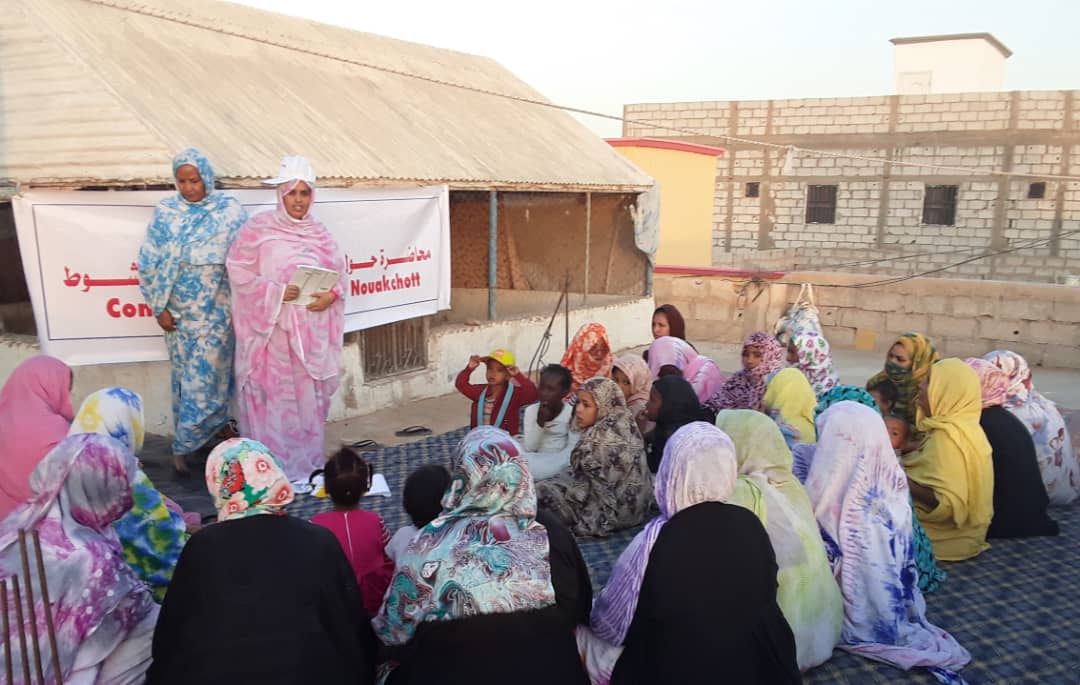
Tireless work to end Gender Based Violence and Female Genital Mutilation in Mauritania
According to WHO more than 200 million girls and women alive today have undergone female genital mutilation (FGM) in 30 countries in Africa, the Middle East, and Asia where it is practiced. FGM is still highly prevalent across Mauritania: in 2021, 64% of girls and women aged 15-49 years have undergone FGM (in some regions, FGM prevalence is as high as 93%). Ending FGM and gender-based violence (GBV) still faces strong conservative barriers. The Association Mauritanienne pour la Promotion de la Famille (AMPF) is a member association of International Planned Parenthood Federation (IPPF). Since its foundation in 1988, AMPF has focused on sensitizing the general population and the country’s political and religious leaders to the personal, health, and economic benefits of family planning and promoting and providing voluntary sexual and reproductive health (SRH) services. AMPF is one of the strongest advocates against gender-based violence (GBV) and female genital mutilation (FGM) in Mauritania. Female genital mutilation (FGM) involves the partial or total removal of external female genitalia or other injury to the female genital organs for non-medical reasons. The practice has no health benefits for girls and women. FGM can cause severe bleeding and problems urinating, and later cysts, infections, as well as complications in childbirth and increased risk of newborn deaths.
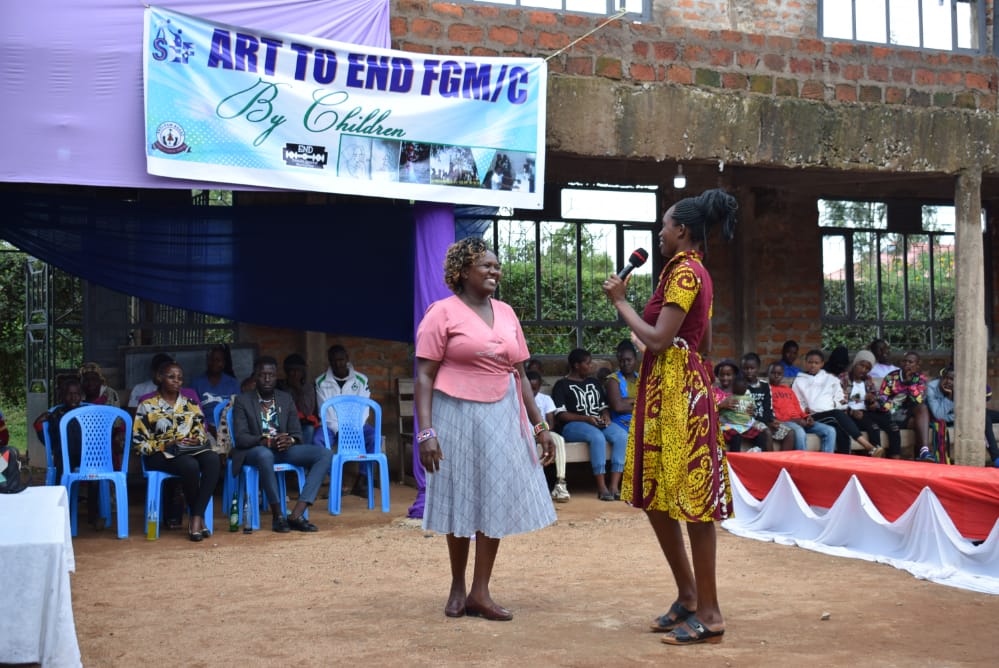
"I was determined to protect my sisters" - Fighting FGM in Kenya
We had the pleasure of interviewing Christine Alfons, founder and Executive Director of the Safe Engage Foundation, a youth-led organization in Kuria, Kenya, working to end female genital mutilation (FGM) and all forms of gender-based violence through mentorship and empowerment. What prompted you to start the Safe Engage Foundation? I grew up in a community where the practise of cutting was really valued, but my father was actually able to learn quite early on that FGM doesn't have any benefit for girls. And so he protected me and my sisters against the cut. His refusal to allow this practice was seen as a very big taboo, and we believe that it is what led to him being killed. He died for us, and so we do what we can to make our father proud, wherever he is. After my dad’s death, I was really determined to protect my sisters and others, and it was at that moment I realized that I can help by volunteering. So when I graduated from high school, I started volunteering with local organizations and NGOs. I did this with a group of other people, and in 2016 we decided that we're going to start our own organization. So then that is when the Safe Engage Foundation was born. My main motive is to empower and educate girls on the need to abandon FGM, and to teach them why they should embrace their sisters, both those who are cut and those who are not. What does the Safe Engage Foundation do? We run youth mentorship programmes, and we have programmes in schools that run weekly and monthly, called the Hold My Hand Initiative and EnlightenUs, respectively. We target both boys and girls to teach them life skill sessions, as well as running SRHR [sexual and reproductive health and rights] sessions. We teach the youth about their bodily autonomy, and about how young girls can protect themselves against FGM and child marriage, and how to report it if it is happening or might happen to them. We also teach why brothers need to protect their sisters against these things. I have come to realize that there are very many young people who can actually act as role models, to other young girls and boys, to be able to grow in a community where they know that they can protect each other and stand up for each other. We also engage parents at meetings in schools, particularly those who still think FGM is the way to go. We teach them positive parenting issues – why women's and girls rights are human rights and why they need to be upheld, and that FGM is actually a violation of those rights. We work with them until we can see like their attitudes are changing. These issues are also related to economic empowerment. We found that women who are not economically empowered (i.e. don’t have an income) cannot make informed decisions about their own body or households. Many girls drop out of school at 15 to get married, or because of the stigma of not being cut, so they don’t have any employable skills into their 20s or 30s or older. So we train them to use their hands to make some items that they can sell, and also use the income that they have generated to reinvest again and keep making money that way. This income also helps them keep their own children in school, so they can in-turn evade child marriage. Since we founded the programme, it has been entirely volunteer-run.
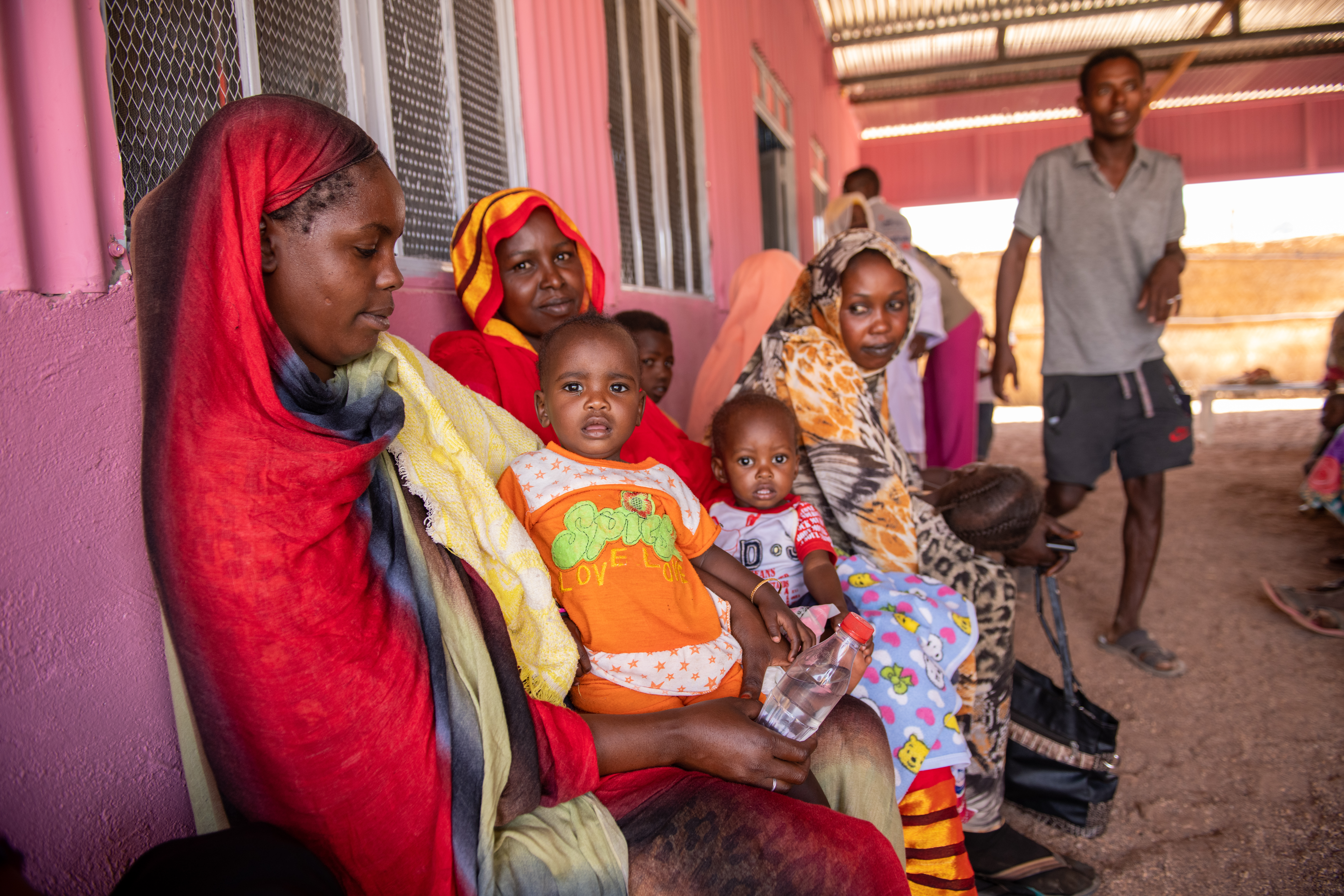
Ethiopian refugees find help in the clinic with pink walls
It's mid-morning, and the Um Rakuba refugee camp on the southern border of Sudan is hot. There are few trees to take shade from the 40°c heat. The dusty main road is bordered on both sides by rows upon rows of huts and tents, temporary accommodation established by The United Nations High Commissioner for Refugees (UNHCR) for the tens of thousands of refugees who have fled over the border from neighbouring Ethiopia since fighting broke out between government forces and the Tigray People’s Liberation Front (TPLF) in November 2020. The severe humanitarian crisis has left more than 5 million people facing starvation. This week, peace talks mediated by the African Union are taking place in South Africa in an aim to break the bitter impasse between the Tigray region and the Ethiopian federal governments and bring succour to the desperate people caught in the middle. Many arrivals tell of being victims of armed groups, facing perilous situations, including looting of their houses, forceful recruitment of men and boys and sexual violence against women and girls. Refugees are arriving with little more than the clothes on their backs, fatigued and in weak conditions after sometimes days of travel. The main road of the camp is peppered with the temporary offices of well-known charities, some providing food aid, others medical care. But there is only one clinic that has bright pink walls and welcomes women, girls, and men inside for free sexual and reproductive healthcare. The Sudan Family Planning Association (SFPA) quickly established a presence here once refugees started to arrive as they understood sexual and reproductive health is not only vital for women’s health and safety but very often overlooked by the humanitarian community.
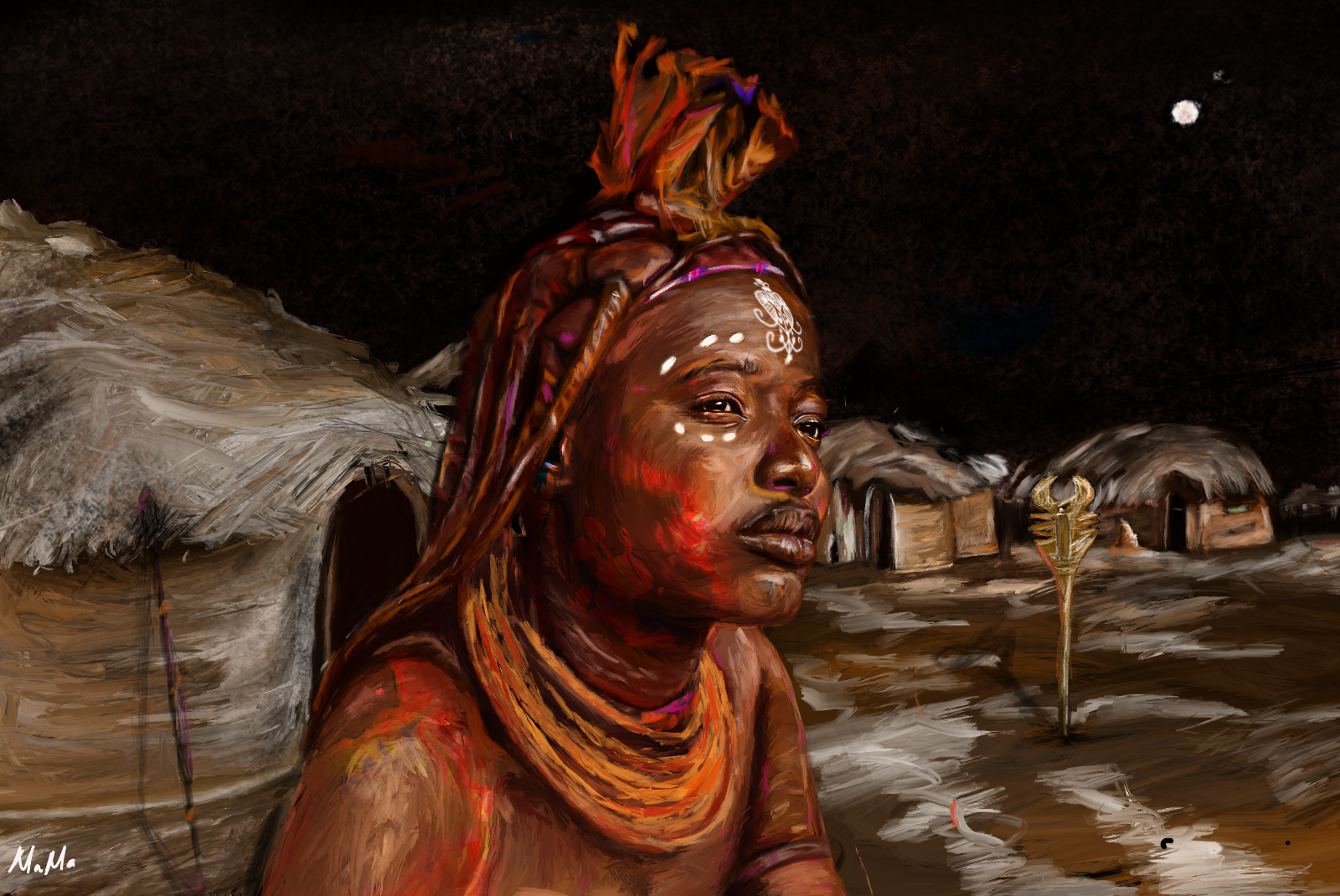
Sexual Pleasure in Precolonial Africa
Has Africa always been conservative towards sex? The answer is No! However, since the assault of slavery and colonization, Africa has viewed certain aspects of pleasure and romance as foreign due to the imposition of foreign values, misinterpretation, and misrepresentation of the precolonial African way of life and sex. Before European contact with Africa, human sexuality was highly valued, and Africa had a well-organized and consistent socialization process where the elderly members of society - like the Ssenga, who were the paternal aunties in the ancient Baganda Kingdom - initiated young members of the society into the concepts and the acts of human sexuality without shame, ridicule or condemnation. However, after colonization, the colonizers succeeded in redefining the concept of African sexuality by shifting its sacredness from communal to individually or religiously motivated sexual relationships, with wrongly channelled freedom of expression and imagination as put by Kiru Taye, and I quote, "Our ancestors were not lying back down and thinking of England" during coitus. Even the sexual art display is not modern. The sexual art display was an integral part of ancient Africa, too prior to colonial domination of the industry after Africa lost its powerful use of creative and sacred imagination in sex as depicted in the ancient Kemetic images depicting Fellatio. Sexuality Definition in Ancient Africa According to Dr. Dee Amanze, sexuality is "not only" the reproductive mechanism but also the basic biological drive that exists in all species and can encompass not just sexual intercourse but also sexual "contacts" in all its forms. In African spirituality, sexuality was believed to have different dimensions, in that sexuality was not just expressed through intercourse because they acknowledged that not all sexual interactions began and ended with baby-making as the optimum intention. Most of the sexual energies were expressed differently through fetishes, fantasies, fashion, attitude, behavior, roles, rituals, dances like Chisamba of Chewa, and intimate relationships. For example: Kuru Warriors Every year at the beginning of hunting season, Kuru Warriors of Africa celebrated a rite of fertility and renewal by piercing the Earth with their spears to reach the womb of the Earth and fertilized the earth by injecting their semen into the ground and once the earth was pregnant, they believed it spiritually bore animals to be hunted. The process of impregnating mother earth among these warriors involved intense mental concentration on the animal that was to be hunted as they orgasmed. Lobi People Another example comes from the Lobi people of modern-day Ghana and Burkina Faso, who had an arousing dance ritual at the end of every season where they entered the waters to celebrate Banguela (ceremony of life). After being aroused by their dance, each warrior would enclose his manhood in a magic skeleton case that symbolized which animal species he wishes to grant the essence of life through his semen. Oshun Force Sequence In the west African OSHUN force sequence depicted how sex energy ran from "desire" to "arousal" to "copulation" to "pleasure fulfilment" to "conception" to "birth" and then ultimately "growth" or the creative energy. OSHUN was viewed in ancient Africa as the deity of sexuality, fertility, femininity and creativity. This is because the sexual balance was OSHUN's central tenet because OSHUN practice did not believe in receiving without giving. OSHUN spiritualized love-making in ancient Africa by referring to sex as the authentic and conscious opening of one's self to the natural sensuality of a spiritual, intimate and orgasmic coming together of two people who are naturally connected through mutual desires, respect and passion that's opens the two up to full liberation, a willing vulnerability and an ecstatic release. However, due to the misrepresentation of OSHUN by Patriarchal boosters like Edward and Mason (1985) in his seminal text Black Gods: Orisa Studies in the New World saying: "OSHUN gives psychological and physical pleasures to the senses and mental pleasure, and she is a prostitute or harlot who brings physical pleasure...” Okajepisa Omukazenda "Okajepisa omukazenda treatment" was also popular among the Himba people, Nothern Namibia and Kunene Angola, where sex was offered to guests; however, among the Maasai and Agikuyu, when a man came home to a spear in front of his house, he would automatically know his wife is having sex with another man and would stay away. Wife Inheritance Among the Luo, Igbo, Yoruba and Hausa-Fulani, wife inheritance was valued as a way of helping widows and orphans in that, when a man died, his brothers and male relatives would sit down to agree on who among them was the most responsible for taking up the responsibilities left by the deceased. But with the introduction of colonial hierarchy and the invention of women, as stated by Oyeronke Oyewumi, such practices took a dangerous turn for women. The Woodabe Peacock Culture The Woodabe sexual culture, on the other hand, had men treating their women the way most birds treat their females. Peacock culture in the Woodabe tribe of Niger, Cameroon, Central African Republic, Nigeria and Chad believed that women had sexual powers and were allowed to have multiple men other than their husbands. Woodabe men even went on to put on heavy makeup and peacock feathers to impress their women and also put on spectacular dances to attract their women. Kunyaza or Kachabali Kunyaza or Kachabali sexual practice is another ancient central African sexual technique originally from Rwanda but was also practiced in Kenya and Uganda. It is a sexual practice focusing only on triggering female ejaculation and not just one but multiple orgasms in women during "heterosexual" encounters. Sexuality in ancient Africa was not only influenced by the interaction between the physical but also between the biological, the physiological, the social, the economic, the political, the religious and, most importantly, the spiritual factors. Most African sexual practices can be found in African folk tales, and most African oral traditions like the African traditional Nubility songs such as this Nubility Rite song from the Ashanti people and others from the Zulu, Agikuyu, Maasai, Mende, Bechuama, Pondo, and Lokele suggested collective expression of sexual "kink" in ancient Africa: "rejoice rejoice, Vagina of Adwoa, if someone eats you, and Fails to reward you, Slay Him" The colonial invasion of Africa, slavery and European religions imposed toxic shame on the sacred African sexual practices... Nzwegu said, "it was a western view to focus on male pleasure as the measure of rocking good times in the sack." The sexualized gender hierarchy of the west eroticizes male dominance and female subjugation as sexual, but Africans should focus on decolonizing their minds from this uncouth conditioning and creating a modern history that pushes beyond colonial and religious-imposed boundaries. Africans, just like their ancestors, should equate sexuality to creativity rather than equating sex to shame. You can follow Swiry on social media: Instagram: https://www.instagram.com/swiri_nyar_kano/ Tiktok: https://www.tiktok.com/@swiry_nyar_kano?_t=8VjixxgryRq&_r=1 Facebook: https://www.facebook.com/Swirynyarkano References 1.Kira Taye His Treasure 2.Egyptian images depicting Fellatio 3.Baba of Karo (Hausa people) By Mary F Smith 4.Invention of Women Oyeronke Oyewumi 5.Kunyaza: The Secret to Female Pleasure by Habeeb Akande 6.Girls Nubility Rites in Ashanti by Peter Sarpong
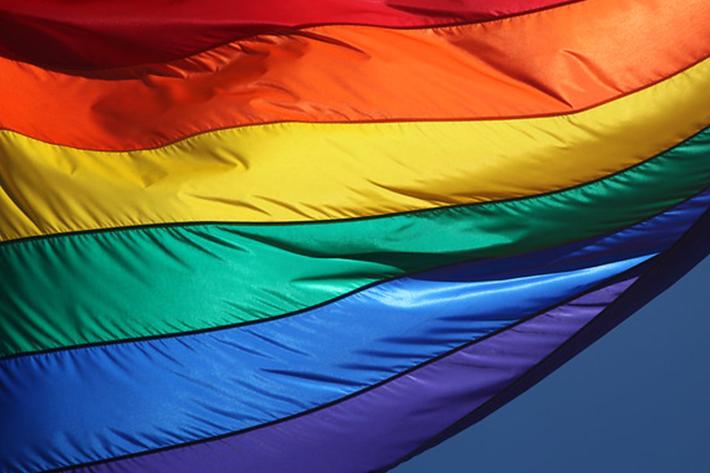
Ugandan LGBTQI+ organization banned by government
On 3 August 2022, the Ugandan National Bureau for Non-Governmental Organizations unfairly halted the activities of Sexual Minorities Uganda (SMUG) – a prominent lesbian, gay, bisexual, transgender, and queer (LGBTQI+) rights organization – for failing to meet the bureau's registration requirements. SMUG has provided sexuality education and advocated for LGBTQI+ healthcare since 2004 and is well-known for providing services and guidance to the LGBTQI+ community in Uganda. The organization also contributes to Uganda's health goals, including the country's HIV/AIDS strategy, which includes the provision of healthcare to vulnerable and marginalized populations. Although SMUG applied to the Uganda Registration Services Bureau (URSB) in 2012, the URSB declined the organization's request on the grounds that SMUG was "operating illegally", a position the organization petitioned with no positive response. In a clear case of harassment and restrictions against Ugandan rights groups working on LGBTQI+ rights, the URSB further asserted that registering SMUG's name would be difficult, calling it "undesirable and un-registrable". In response to the ban the Africa Regional Director for the International Planned Parenthood Federation (IPPF) urged the Ugandan government to review its decision to suspend SMUG and to work towards accommodating the organization's mandate of advancing the rights of the LGBTQI+ community in Uganda. Marie-Evelynne-Petrus-Barry said: "As a global human rights organization and the world's largest sexual and reproductive healthcare provider, the International Planned Parenthood Federation upholds the rights of all people, regardless of their sexual orientation. "The Ugandan government's ban of SMUG has created huge anxiety among health service providers, human rights defenders, and members of the LGBTQI+ community, who risk their lives daily so that LGBTQI+ people can access healthcare and information just as any other person would. "We ask the Ugandan government to urgently reconsider its decision to suspend SMUG and to put an end to laws and policies that criminalize, target and endanger members of the LGBTQI+ community and the organizations that advocate for their rights." Petrus-Barry added: "IPPF works to ensure that people with diverse sexual orientation, gender identity and/or expression, and sex characteristics (SOGIESC) – including lesbian, gay, bisexual, trans, and intersex people have access to the full set of human rights enshrined in international human rights laws. IPPF is willing to work with the Ugandan government and other stakeholders to ensure that all Ugandan people can access these rights without restraint." For media enquiries, please contact Mahmoud Garga, Lead Specialist – Strategic Communication, Media Relations and Digital Campaigning, IPPF Africa Regional Office (IPPFARO) on [email protected] or +254 704 626 920 ABOUT IPPF AFRICA REGION (IPPFAR) The International Planned Parenthood Federation Africa Region (IPPFAR) is one of the leading sexual and reproductive health (SRH) service delivery organizations in Africa and a leading sexual and reproductive health and rights (SRHR) advocacy voice in the region. Headquartered in Nairobi, Kenya, the overarching goal of IPPFAR is to increase access to SRHR services to the most vulnerable youth, men and women, in sub-Saharan Africa. Supported by thousands of volunteers, IPPFAR tackles the continent's growing SRHR challenges through a network of Member Associations (MAs) in 40 countries. We do this by developing our MAs into efficient entities with the capacity to deliver and sustain high-quality, youth-focused and gender-sensitive services. We work with Governments, the African Union, Regional Economic Commissions, the Pan-African Parliament, and United Nations bodies, among others, to expand political and financial commitments to sexual and reproductive health and rights in Africa. Learn more about the IPPF Africa Region on their website or follow them on Facebook, Twitter, Instagram and YouTube.
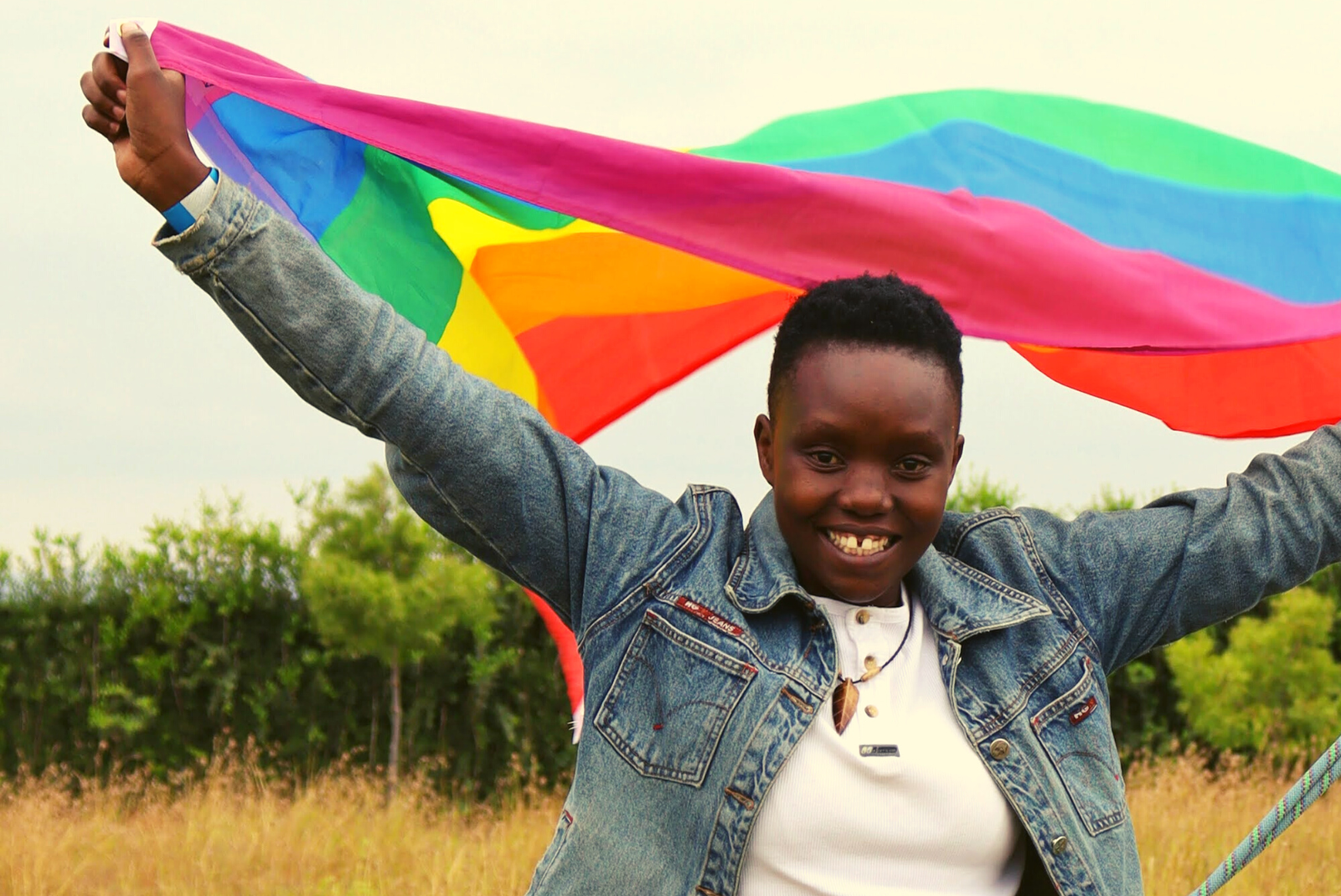
Pride 2022: Fahe Kerubo in the spotlight
Fahe Kerubo is a 29-year-old Youth Health Advocate & LGBTQIA+ activist, who is currently serving as the Youth Committee Chairperson for Reproductive Health Network Kenya. We interviewed them for Pride Month 2022: How do you celebrate Pride Month and what does it mean to you? Pride Month is a time for me to reflect deeper on what it means to be queer, what it means to be masculine presenting, and what it means to live an authentic life, especially in this era. It is a time for celebration, to re-evaluate, and to remember the lives we have lost and the battles we have to go through for being authentically “us”. What was it like for you growing up in Kenya as part of the LGBTQIA+ community? Growing up in Kenya as a queer, non-binary, masculine-presenting person was a constant battle with the world, for them to see me beyond my sexual orientation and my gender identity. I am misgendered every day and it is expected of me to suck it up, deal with my feelings, and be okay with that. Here, privilege dictates your sense of dignity, autonomy, and power to decide for yourself. For a queer person from the slums of Kenya – me being one of them – privilege is not something afforded to them. I grew up constantly listening and heeding to voices telling me what to do, how to dress, how and when to speak. So many voices saying “do this and that” – so many voices but my own. Thanks to education and the humanitarian spaces, I am getting to learn that I can decide for myself whether to be in a relationship or not and with whom. Learning that nobody can decide for me but myself is the greatest gift life has given me, and that alone has given me power to rise above stigma, and most importantly, use my voice in advocating for the prioritization of queer SRHR. Why is it important to include LGBTQIA+ issues in sexual and reproductive health and rights (SRHR)? The prioritization of queer SRHR issues is very important because the LGBTQIA+ community is not openly spoken about, especially in mainstream discourses, while on the ground these are lives that are constantly at risk and very vulnerable. The criminalization of our community itself has put us at a risk of acquiring STIs and HIV. Rates of unsafe abortions are also high in the community, and victims of violence are underreported. This is a community with needs that must be addressed. Within the workplace, what steps can be taken to promote a positive and healthy environment for colleagues who identify as LGBTQIA+? 1. Take LGBTQIA+ discrimination seriously – establish a strong anti-discrimination policy to be followed by all staff 2. Foster a gender-neutral environment – such as establishing unisex toilets and using gender-neutral language 3. Provide training, mentoring, and support programs to LGBTQIA+ staff 4. Support LGBTQIA+ events or be part of them 5. Create networks – LGBTQIA+ employee networks can be very powerful ways for colleagues to come together and share experiences And finally, who or what is your LGBTQIA+ hero and why? Nena Na Binti Hotline offered the LGBTQIA+ community sexual and reproductive health services (including safe abortion care) during the COVID-19 pandemic, and continues to do so. They even offered services to members of the community who didn't have money to pay. I know what it means to want to terminate an unwanted pregnancy and not have money to pay for a safe service. A constant battle we deal with is the high cost of health services, which is one of the reasons we avoid seeking care. All the queer people I referred to Nena Na Binti Hotline have been served and we live to tell a happy tale. How can they not be my hero this Pride Month?
Pagination
- Previous page
- Page 4
- Next page







